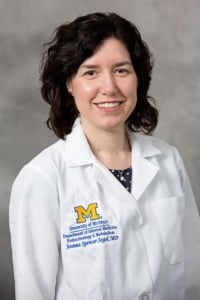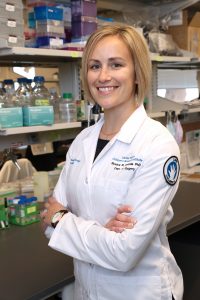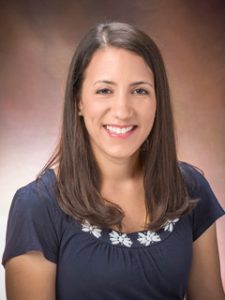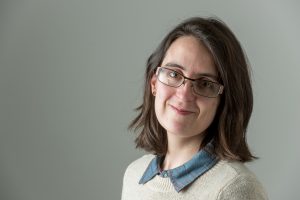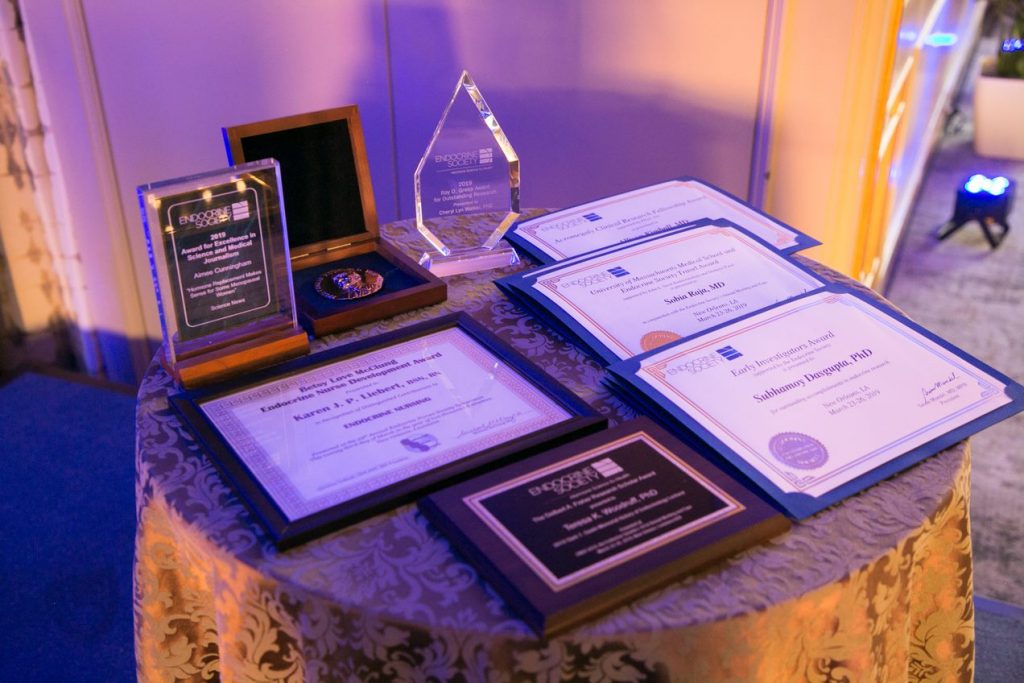
Each year at ENDO, the Endocrine Society recognizes endocrine researchers who are in the blossoming stages of their research careers with Early Investigator Awards. Endocrine News rounded up this year’s recipients to ask them about their research, their labs, and the award will help them reach their research goals.
For researchers in the early stages of their careers, recognition of their work is welcomed inspiration. Each year, the Endocrine Society bestows its Early Investigators Awards and thus inspires its recipients.
The awards were established to aid in the development of early career investigators and to spotlight their accomplishments in endocrine-related research. Endocrine News spoke with the five 2019 winners to learn more about their goals and what the award will mean to their work.
This year’s winners are: Subhamoy Dasgupta, PhD, of the Roswell Park Cancer Institute in Buffalo, N.Y.; Caroline Gorvin of the University of Birmingham in the United Kingdom; Mary Ellen Vajravelu, MD, of Children’s Hospital of Philadelphia, Pennsylvania; Monica Laronda, PhD, from the Ann & Robert H. Lurie Children’s Hospital of Chicago; and Joanna Spencer-Segal, MD, PhD, of the University of Michigan in Ann Arbor.
Endocrine News: To get an idea of who comprises our “early investigators,” at what stage are you in your academic fellowship or year as faculty?
Subhamoy Dasgupta: I am an assistant professor of oncology and started my laboratory at Roswell in July 2017. I’m an early career investigator faculty who has received their terminal degree within last 10 years.
Caroline Gorvin: I moved to the University of Birmingham, UK, in January 2018 to begin my research group and have spent the intervening period establishing my independent research program and applying for funding. Prior to this, I spent nine years at the University of Oxford, initially as a PhD student, then as a post-doctoral researcher.
“Our work is really cross-disciplinary and translational. I hope to increase the awareness among endocrinologists of the long-term consequences of stress in general and severe illness in particular. Many of our findings can be considered in the context of the patients we treat every day.” – Joanna Spencer-Segal, MD, PhD, University of Michigan, Ann Arbor
Mary Ellen Vajravelu: I am in my second year as faculty.
Monica Larondo: I started my assistant professor faculty position in the fall of 2016.
Joanna Spencer-Segal: I am in my first year as an assistant professor.
EN: What inspired you to apply for the award? What was your reaction when you learned the news?
Dasgupta: I came to know about the award from my postdoc mentor who encouraged me to apply. This is such a distinguished award for early-career investigators — I felt so excited and honored to be chosen as one of the recipients.
“Those in both clinical and foundational endocrinology research look to the Endocrine Society for support in advocacy, educational tools, practice guidelines, and research resources. Recognition by such a prestigious group adds weight to my lab’s research topics and highlights our efforts to provide options for fertility and hormone preservation and restoration.” – Monica Laronda, PhD, Ann & Robert H. Lurie Children’s Hospital, Chicago, Ill.
Gorvin: What really inspired me to apply for the award was the opportunity to attend ENDO 2019 as there are limited funds available for junior faculty to attend international meetings. I’d been to several ENDO meetings in previous years and always found the poster sessions to be an excellent forum for networking, and the focused symposia to be very informative. I also realized that I was probably in the perfect position to apply having recently taken up my independent position, and had a very productive final year in Oxford.
Vajravelu: As a junior investigator, it can be easy to get lost in the crowd. I was excited to learn about this award and the Endocrine Society’s support of early-career investigators, and I felt honored to have been chosen as a recipient.
Larondo: While I belong to several different societies that span the main topics of my research, I consider the Endocrine Society to be my primary professional society. I was very excited to hear that my research would be recognized by a society that I respect.
Spencer-Segal: I was inspired by seeing other distinguished colleagues receive the award in the past. I knew that it would be a privilege to be counted among this group. I noted that the Society takes care to spotlight the work of these early investigators, which can help boost their careers.
EN: Tell us about your research.
Dasgupta: My laboratory is interested in understanding the molecular complexities associated with endocrine cancers that are highly aggressive and resistant to drugs. We have identified certain adaptations that allow tumors to escape therapeutic intervention and emerge as a recurrent cancer.
Gorvin: At a broad level, my research focuses on fundamental aspects of trafficking and signaling of membrane proteins, and how their impairments contribute to endocrine and metabolic disease. In recent years this has focused on two distinct areas: Investigating how mutations in the prolactin receptor contribute to hyperprolactinaemia and prolactinoma.
“I am grateful for the recognition provided by the Early Investigator Award, which was a helpful confidence-booster at a much-needed time as I transitioned from fellowship to faculty.” – Mary Ellen Vajravelu, MD, Children’s Hospital of Philadelphia, Pennsylvania
Vajravelu: My current research is focused on pediatric type 2 diabetes and prediabetes. I have a background in health services research and quality improvement science, and am interested in the use of behavioral economic-informed approaches to challenging problems such as addressing obesity in youth at risk for type 2 diabetes.
Larondo: I am interested in how support cells and the surrounding microenvironment can influence gametogenesis. My lab is particularly interested in the ovarian matrisome and how we may use this foundational knowledge to engineer a bioprosthetic ovary to restore fertility and hormone function in patients with diseases or treatments that cause premature ovarian insufficiency.
Spencer-Segal: My lab is interested in the neuroendocrine mechanisms of vulnerability to stress. Specifically, we currently focus on the long-term consequences of severe immune stress, such as sepsis, on the brain, behavior, and regulation of the stress response. We work in a mouse model of sepsis, cecal ligation and puncture, and we seek to determine how brain dysfunction is disrupted in sepsis survivors, and what role hormones play in this process.
EN: How was the Excellence in Endocrinology event at ENDO 2019 in New Orleans?
Dasgupta: It was an outstanding event where I got the opportunity to meet with the “peers in the field.”
Gorvin: ENDO 2019 as usual was a great meeting, with fantastic scientific content and many opportunities to catch-up with old friends and collaborators. New Orleans was an ideal location, and it was nice to escape the murky March weather in the UK for a bit of Louisiana sunshine.
“At a broad level, my research focuses on fundamental aspects of trafficking and signaling of membrane proteins, and how their impairments contribute to endocrine and metabolic disease.” – Caroline Gorvin, University of Birmingham, Birmingham, UK
Larondo: It was a great event. It was fun to share a dinner with other award recipients, including my mentor Teresa Woodruff, who received the Delbert A. Fisher Award.
Spencer-Segal: It was such an honor to be recognized at this event! Just sitting among all the giants in the field was such a humbling and inspiring experience.
EN: What are your future research plans and how do you hope this award will help support your goals?
Dasgupta: Our goal is to find a cure for endocrine tumors by blocking the escape routes that support cancer growth. We have identified metabolic alterations in tumors as a major player in therapeutic resistance and current strategy in the laboratory is to identify the important players that could be targeted. The award brings national recognition to my laboratory for the recent discoveries made, and also provides strong motivation and inspiration to continue our work.
Gorvin: I am in the process of expanding my research program to investigate how endocrine signals are integrated by GPCRs to affect appetite, food intake, and obesity. I was recently awarded the Academy of Medical Sciences Springboard Award to pursue this research and will be using state-of-the-art imaging techniques and advanced signaling assays to achieve this. The Early Investigator Award has helped keep me updated with the latest research in my field by providing me with complimentary membership to the Endocrine Society and assisted my attendance at the ENDO 2019 meeting.
“My laboratory is interested in understanding the molecular complexities associated with endocrine cancers that are highly aggressive and resistant to drugs. We have identified certain adaptations that allow tumors to escape therapeutic intervention and emerge as a recurrent cancer.” – Subhamoy Dasgupta, PhD, Roswell Park Cancer Institute, Buffalo, N.Y.
Vajravelu: I will continue to develop my research program at The Children’s Hospital of Philadelphia while applying for an individual career development award. I am grateful for the recognition provided by the Early Investigator Award, which was a helpful confidence-booster at a much-needed time as I transitioned from fellowship to faculty.
Larondo: Those in both clinical and foundational endocrinology research look to the Endocrine Society for support in advocacy, educational tools, practice guidelines, and research resources. Recognition by such a prestigious group adds weight to my lab’s research topics and highlights our efforts to provide options for fertility and hormone preservation and restoration.
Spencer-Segal: Our work is really cross-disciplinary and translational. I hope to increase the awareness among endocrinologists of the long-term consequences of stress in general and severe illness in particular. Many of our findings can be considered in the context of the patients we treat every day. My lab is unique not only as one of the first groups studying this important area of stress biology, but also because of our broad approach to sepsis survivors. I hope to increase the recognition of our group and the topic in general, including the important role of the endocrine system.
—Glenda Fauntleroy Shaw is a freelance writer based in Carmel, Ind. She is a regular contributor to Endocrine News.

